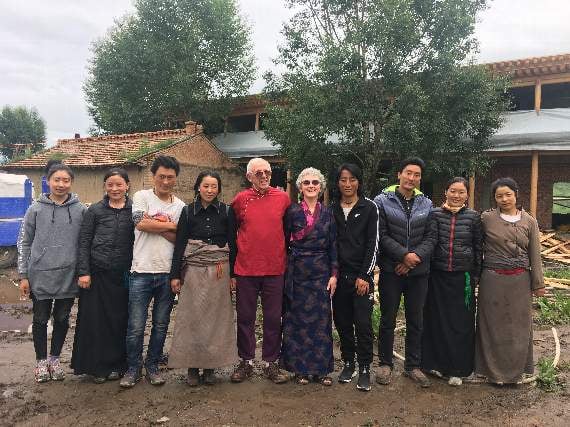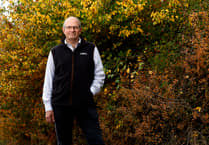A lifetime working in the weaving industry has led to a South Hams man helping to provide sustainable employment for a foreign family in need.
Malcolm Weir, from West Charleton, travelled to the small village of Amchok in Tibet last month for a three week trip teaching a family of Tibetan nomads how to hand-weave.
The family is currently in the process of building a new craft centre called Chamtsee, which is Tibetan for ‘compassion’. The building will eventually have eight bedrooms, a café/restaurant, sales gallery, and a craft area with dyeing, spinning, warping, weaving and finishing.
Seven months ago he received an email from Roundhouse in Totnes looking for volunteers to go to Tibet and exchange weaving skills. After back and forth emails, experienced dye spinner and knitter, Amanda Hannaford, got ahold of him saying that she, too, wanted to go.
Upon arrival, Malcolm and Amanda helped to teach the family everything from basic weaving, fabric design and construction, to spinning systems and warping, beaming and drawing.
Their purpose is to use yak down, known locally as khullu, which is a soft, cashmere-like fibre, to produce high quality woven and knitted products to sell to tourists in the area. They hope that this will provide sustainable employment at a time when the traditional nomadic lifestyle is rapidly changing.
Amanda and Malcolm were directly involved in the spinning, warping and weaving sections in a large tent, where, in addition to some locally made small handlooms, there were two large looms that were recently delivered from India.
It became very clear that they were poorly set up, and much of Malcolm’s time was initially spent fine-tuning the looms in order to improve the weaving performance and the resulting fabric quality.
Every morning, Malcolm and Amanda led two hours of theory which covered everything they needed to know about wool quality numbers, fabric design construction and the like.
However, the warping and weaving team didn’t speak English, so much of their communication was done through sign language and demonstrating wherever possible. Malcolm recalls the experience to be ‘quite challenging’ and said, “there were times when progress seemed very slow indeed.”
There was an interpreter, but he was only available for short periods.
Malcolm said: “Including meals we were on site for 12 hours a day, and at high altitude it was both physically and mentally tiring.
“However, we did manage to conclude a number of spinning and weaving trials successfully and the efficiency and quality of the weaving did improve dramatically over the three weeks, which was very satisfying.”
Malcolm has spent most of his working life involved in the weaving industry. He spent time in northern UK doing an apprenticeship where he learned a wealth of background knowledge on the subject and gained a lot of experience before the UK textile industry went into a serious decline.
In 2010, Malcolm decided to start teaching people how to hand-weave after he noticed that “not many people actually know how”.
He now runs a weaving group at Washbrook Farm in Kingsbridge and a beginners course that commences every February.
He also assists in running a similar course at the Devon Weavers Workshop in Ashprington.





Comments
This article has no comments yet. Be the first to leave a comment.